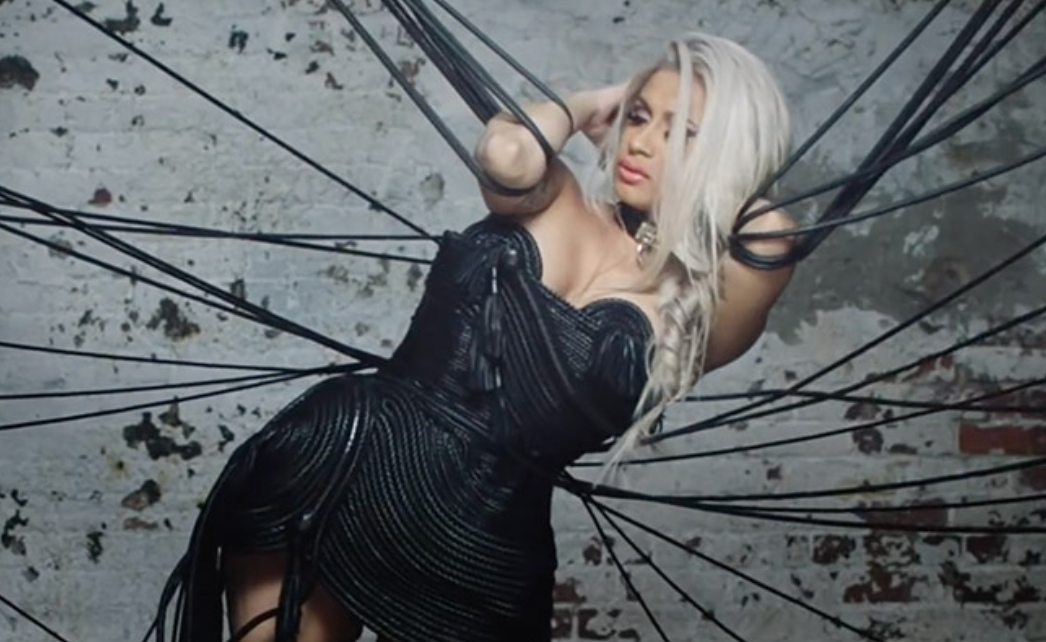Proving that no matter how objectively “bad” an album is, it can still have any number of endless hits, Cardi B’s latest single from Invasion of Privacy, “Ring,” finds her in yet another conceptual grafting of someone else’s vision (see: “Be Careful” for reference)–this time, an analog version of Lady Gaga’s “Telephone” with Kehlani in the Beyoncé “sidekick” role (though it is entirely because of Kehlani that this song is listenable, just as it was the case with Beyoncé’s part in “Telephone”).
Opening with waves crashing to indicate some sort of inner tumult turned outward, Cardi B, imprisoned by telephone wires (a quaint concept considering her modern flair), was at least partially on board with the Mike Ho-directed premise because of how effortlessly all those wires helped conceal her then pregnancy. But yes, it complements the fraught sentiment of the song, ardent in detailing feelings of abandonment all because of Alexander Graham Bell’s perfected design.
Cuts to rotary phones not being dialed play into the lyrics, “You don’t hit my line no more, you don’t make it ring, ring, ring,” in addition to the sea of telephone booths (suspended in mid-air above a literal sea for added drama and surreality à la the M.C. Escher influence in Ariana Grande’s “No Tears Left to Cry” video), imbue the video with a combined sense of urgency and sadness. With both women making the signature “telephone gesture” with their hands, we can almost feel them trying to conjure the object of their unrequited love’s call. To no avail.
And as Cardi raps her allusions to numbers we all know (and kind of hate), we, too, recall our own moments of bruised pride in this type of scenario with her urging, “Hit me when you free, 1-800/It’s emergency, call me 911/’Cause right now I’m out here tryna find someone/The ring on my phone, ring on my finger (brrr)/You actin’ like you ain’t tryna do either (yeah)/Once a good girl, watch me turn diva/Here goes my heart, I put it on speaker (oh).”
Lady Gaga (who, like Cardi, relishes using Quentin Tarantino for video inspiration), diversely, wields the emblem of the telephone as a form of being imprisoned by another’s call (whereas Cardi does so in terms of an absence of another’s call) in what now seems like what will remain her best music video, “Telephone.” The perpetual torture of being at the mercy of notifications, signifying demands that one either can’t or does not want to meet, is her own version of incarceration. In contrast, Cardi and Kehlani’s chains are a result of her obsession with getting a call or text that won’t come.
Yet if the duo would just take a page from the independent/leave me the hell alone spirit of Beyoncé as she screams, “Boy, the way you blowin’ up my phone/Won’t make me leave no faster/Put my coat on faster/Leave my girls no faster I shoulda left my phone at home ‘Cause this is a disaster/Callin’ like a collector Sorry, I cannot answer,” they wouldn’t need to be so enslaved by the shackles of the phone wires, tying neither of them to anyone worthwhile at the other end.
In both senses of each song, the women in question are referring to a man who is either too possessive or too uncaring in his displays of phone etiquette (or rather, zero phone etiquette). In Lady Gaga and Beyoncé’s narrative, the irritation of being harassed too much prompts them to go so far as to instate a public killing spree in order to get rid of him–Tyrese, specifically–which is probably the original concept Bey wanted for the “Bug-A-Boo” video but didn’t have the creative control to do so.
With a rotary phone moving counterclockwise by an invisible hand in “Ring,” it harkens back to the “Telephone” video once more, which also uses the old school version of the device to exhibit the full weight (somewhat literally) of how cumbersome getting or not getting a call feels. Toward the conclusion, Kehlani picks up a phone and shouts into a dial tone, as Cardi continues to look like a less powerful Clark Kent, standing in the phone booth as though trapped. And as she hangs up the phone in defeat while hovered in the air, one can’t help but think of its sharp contrast to the denouement of “Telephone,” so much more empowered with female agency.
For as much as women like to talk about not needing a man or being dependent on the so-called “approval” or “confidence boost” that comes with his desire, a song and video like “Ring” is, while certainly earnest, a bit of a step backward from the more glorifying of autonomy “Telephone”–vengeful though it may be as it iterates that hell hath no fury like a woman’s scorn. Which is something of a better message than showcasing a girl feeling tied up and held captive by emotions because a man didn’t call her.



















